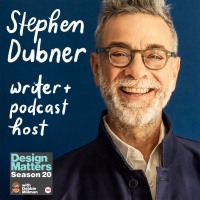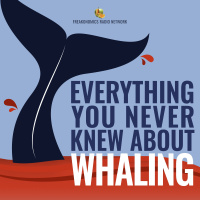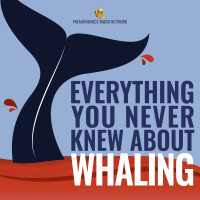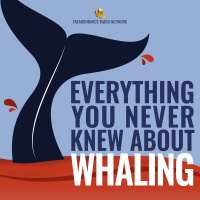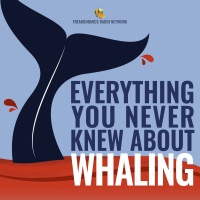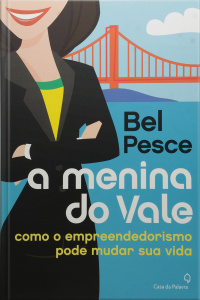Synopsis
Discover the hidden side of everything with Stephen J. Dubner, co-author of the Freakonomics books. Each week, Freakonomics Radio tells you things you always thought you knew (but didnt) and things you never thought you wanted to know (but do) from the economics of sleep to how to become great at just about anything. Dubner speaks with Nobel laureates and provocateurs, intellectuals and entrepreneurs, and various other underachievers. Special features include series like The Secret Life of a C.E.O. as well as a live game show, Tell Me Something I Dont Know.
Episodes
-
652. Inside the Horse-Industrial Complex
07/11/2025 Duration: 01h52sHow does Kentucky keep itself atop the thoroughbred industry? Is a champion stallion really worth $200,000 per date? And how many hands can one jockey have? (Part two of a series, “The Horse Is Us.”) SOURCES:Emily Plant, thoroughbred researcher and statistician.Jill Stowe, professor of economics at the University of Kentucky.Mark Taylor, president of Taylor Made Farm.Oscar Gonzalez, vice chair of the California Horse Racing Board.Richard Migliore, head racing analyst for Fox Sports and New York Racing Association, retired jockey. RESOURCES:"Horse racing industry braces for crackdown on illegal immigration," by Ximena Bustillo (NPR, 2025)."Conceptualizing the Kentucky Horse Industry as an Economic Cluster," by Lori Garkovich (Bluegrass Equine Digest, 2009). Hosted by Simplecast, an AdsWizz company. See pcm.adswizz.com for information about our collection and use of personal data for advertising.
-
651. The Ultimate Dance Partner
31/10/2025 Duration: 01h08minFor most of human history, horsepower made the world go. Then came the machines. So why are there still seven million horses in America? (Part one of a series, “The Horse Is Us.”) SOURCES:Ann N. Greene, historian of 19th century America, retired professor at the University of Pennsylvania.Constance Hunter, chief economist at the Economist Intelligence Unit.Elizabeth Bortuzzo, professional horse rider.Mark Paul, professor of economics at Rutgers University.Peter Frankopan, professor of global history at Oxford History. RESOURCES:"2023 Economic Impact Study of the U.S. Horse Industry," (American Horse Council Foundation, 2024).Riding to Arms, by Charles Caramello (2022).The Horse in the City, by Clay McShane and Joel Tarr (2011).Horses at Work, by Ann Norton Greene (2008). Hosted by Simplecast, an AdsWizz company. See pcm.adswizz.com for information about our collection and use of personal data for advertising.
-
Are Two C.E.O.s Better Than One? (Update)
29/10/2025 Duration: 47minSpotify, Oracle, and Comcast have each recently announced they’re going with co-C.E.O.s. In this 2023 episode, we dig into the research and hear firsthand stories of triumph and disaster. Also: lessons from computer programmers, Simon and Garfunkel, and bears versus alligators. SOURCES:Jim Balsillie, retired chairman and co-C.E.O. of Research In Motion.Mike Cannon-Brookes, co-founder and C.E.O. of Atlassian.Scott Farquhar, co-founder and former co-C.E.O. of Atlassian.Marc Feigen, C.E.O. advisor.Jeffrey Sonnenfeld, professor of management studies and senior associate dean at the Yale School of Management and founding president of the Chief Executive Leadership Institute.Laurie Williams, professor of computer science at North Carolina State University. RESOURCES:"Scott Farquhar to resign as joint CEO of Atlassian," by Jonathan Barrett (The Guardian, 2024)."Is It Time to Consider Co-C.E.O.s?" by Marc A. Feigen, Michael Jenkins, and Anton Warendh (Harvard Business Review, 2022)."The Costs and Benefits of Pair P
-
650. The Doctor Won’t See You Now
24/10/2025 Duration: 51minThe U.S. has a physician shortage, created in part by a century-old reform that shut down bad medical schools. But why haven’t we filled the gap? Why are some physicians so unhappy? And which is worse: a bad doctor or no doctor at all? SOURCES:Karen Clay, professor of economics and public policy at Carnegie Mellon University.Rochelle Walensky, physician-scientist and former director of the CDC. RESOURCES:"Medical School Closures, Market Adjustment, and Mortality in the Flexner Report Era," by Karen Clay, Grant Miller, Margarita Portnykh, and Ethan Schmick (National Bureau of Economic Research, 2025)."Application Overload — A Call to Reduce the Burden of Applying to Medical School," by Rochelle Walensky and Loren Walensky (New England Journal of Medicine, 2025)."Challenges to the Future of a Robust Physician Workforce in the United States," by Rochelle Walensky and Nicole McCann (New England Journal of Medicine, 2025)."The first step to addressing the physician shortage," by Rochelle Walensky and Nicole McCann
-
A Question-Asker Becomes a Question-Answerer
17/10/2025 Duration: 01h14minFor the 20th anniversary of Freakonomics, Debbie Millman of Design Matters interviews Stephen Dubner about his upbringing, his writing career, and why it's important to “swing your swing.” Plus: a sneak peek at a new project. SOURCES:Debbie Millman, writer and host of Design Matters with Debbie Millman. RESOURCES:"Stephen J. Dubner," by Design Matters with Debbie Millman (2025).Turbulent Souls: A Catholic Son's Return To His Jewish Family, by Stephen Dubner (1999)."Choosing My Religion," by Stephen Dubner (New York Times, 1996). EXTRAS:"In Search of the Real Adam Smith," by Freakonomics Radio (2022). Hosted by Simplecast, an AdsWizz company. See pcm.adswizz.com for information about our collection and use of personal data for advertising.
-
How Can We Break Our Addiction to Contempt? (Update)
15/10/2025 Duration: 40minArthur Brooks, an economist and former head of the American Enterprise Institute, believes that there is only one remedy for our political polarization: love. In this 2021 episode, we ask if Brooks is a fool for thinking this — and if perhaps you are his kind of fool? SOURCES:Arthur Brooks, professor of public and nonprofit leadership at Harvard University. RESOURCES:“Vital Statistics on Congress,” by Molly Reynolds and Naomi Maehr (Brookings Institute, 2024).Dopamine Nation: Finding Balance in the Age of Indulgence, by Anna Lembke (2021).“Reading Too Much Political News Is Bad for Your Well-Being,” by Arthur Brooks (The Atlantic, 2020).Love Your Enemies: How Decent People Can Save America from the Culture of Contempt, by Arthur Brooks (2019).“This 75-Year Harvard Study Found the 1 Secret to Leading a Fulfilling Life,” by Melanie Curtin (Inc., 2017).The Conservative Heart: How to Build a Fairer, Happier, and More Prosperous America, by Arthur Brooks (2015).“Grin and Bear It: The Influence of Manipulated Facia
-
649. Should Ohio State (and Michigan, and Clemson) Join the N.F.L.?
10/10/2025 Duration: 55minSoccer leagues around the world use a promotion-and-relegation system to reward the best teams and punish the worst. We ask whether American sports fans would enjoy a similar system. (Part two of a two-part series.) SOURCES:Domonique Foxworth, sports analyst and former N.F.L. player.Stefan Szymanski, professor of sport management at the University of Michigan.Victor Matheson, professor of economics at the College of the Holy Cross. RESOURCES:"'Root, root, root for the home team" did TV kill minor league baseball in the 1950s?" by Stefan Szymanski (University of Michigan, 2025)."European and North American Sports Differences (?): A Quarter Century on," by Stefan Szymanski (Principles and Paradoxes of Sports Economics, 2024).National Pastime: How Americans Play Baseball and the Rest of the World Plays Soccer, by Stefan Szymanski and Andrew Zimbalist (2006). EXTRAS:"When Is a Superstar Just Another Employee? (Update)," by Freakonomics Radio (2025)."The Longest Long Shot," by Freakonomics Radio (2016). Hosted by
-
648. The Merger You Never Knew You Wanted
03/10/2025 Duration: 01h06minThe N.F.L. is a powerful cartel with imperial desires. College football is about to undergo a financial reckoning. So maybe they should team up? (Part one of a two-part series.) SOURCES:DeMaurice Smith, former executive director of the National Football League Players Association.Domonique Foxworth, sports analyst and former N.F.L. player.Jeffrey Kessler, partner at the law firm of Winston & Strawn.Oliver Luck, sports executive and consultant.Victor Matheson, professor of economics at the College of the Holy Cross. RESOURCES:Turf Wars: The Fight for the Soul of America's Game, by DeMaurice Smith (2025)."Is there a Case for Subsidizing Sports Stadiums?" by Victor Matheson (Journal of Policy Analysis and Management, 2018). EXTRAS:"America’s Hidden Duopoly," by Freakonomics Radio (2018)."Should the U.S. Merge With Mexico?" by Freakonomics Radio (2014). Hosted by Simplecast, an AdsWizz company. See pcm.adswizz.com for information about our collection and use of personal data for advertising.
-
Is the U.S. Really Less Corrupt Than China? (Update)
26/09/2025 Duration: 57minIn this episode we first published in 2021, the political scientist Yuen Yuen Ang argues that different forms of government create different styles of corruption — and that the U.S. and China have more in common than we’d like to admit. SOURCES:Yuen Yuen Ang, professor of political science at Johns Hopkins University. RESOURCES:"China’s Anti-Graft Show Is Educational, With Unintended Lessons," by Li Yuan (The New York Times, 2022).China’s Gilded Age: The Paradox of Economic Boom and Vast Corruption, by Yuen Yuen Ang (2020)."A Fair Assessment of China’s IP Protection," by Shang-Jin Wei and Xinding Yu (Project Syndicate, 2019).The Bankers' New Clothes: What's Wrong with Banking and What to Do about It, by Anat Admati (2013)."A Fistful of Dollars: Lobbying and the Financial Crisis," by Deniz Igan, Prachi Mishra, and Thierry Tressel (2011). EXTRAS:"China Is Run by Engineers. America Is Run by Lawyers." by Freakonomics Radio (2025).American Culture series by Freakonomics Radio (2021). Hosted by Simplecast, an AdsW
-
647. China Is Run by Engineers. America Is Run by Lawyers.
19/09/2025 Duration: 01h01minIn his new book “Breakneck,” Dan Wang argues that the U.S. has a lot to learn from China. He also says that “no two peoples are more alike.” We have questions. SOURCES:Dan Wang, research fellow at the Hoover Institution at Stanford University, author of Breakneck: China's Quest to Engineer the Future. RESOURCES:Breakneck: China's Quest to Engineer the Future, by Dan Wang (2025).The Anaconda in the Chandelier: Writings on China, by Perry Link (2025)."Is the U.S. Ready for the Next War?" by Dexter Filkins (The New Yorker, 2025)."How smartphones made Shenzhen China’s innovation capital," by Dan Wang (2016).How China Escaped the Poverty Trap, by Yuen Yuen Ang (2016).The Art of Not Being Governed, by Jame Scott (2009). EXTRAS:"The Engineering State and the Lawyerly Society: Dan Wang on his new book 'Breakneck,'" by the Sinica Podcast (2025)."Is the U.S. Really Less Corrupt Than China?" by Freakonomics Radio (2021). Hosted by Simplecast, an AdsWizz company. See pcm.adswizz.com for information about our collection a
-
Is the World Ready for a Guaranteed Basic Income? (Update)
17/09/2025 Duration: 36minA lot of jobs in the modern economy don’t pay a living wage, and some of those jobs may be wiped out by new technologies. So what’s to be done? We revisit an episode from 2016 for a potential solution. SOURCES:Erik Brynjolfsson, professor of economics at Stanford University.Evelyn Forget, professor of economics and community health sciences at the University of Manitoba.Sam Altman, C.E.O. of OpenAI.Robert Gordon, professor emeritus of economics at Northwestern University.Greger Larson, professor of archeology at the University of Oxford. RESOURCES:"Here's what a Sam Altman-backed basic income experiment found," by Megan Cerullo (CBS News, 2024).Utopia for Realists, by Rutger Bregman. The Correspondent (2016).The Second Machine Age, by Erik Brynjolfsson and Andrew McAfee (2014)."The Town With No Poverty: Using Health Administration Data To Revisit Outcomes of a Canadian Guaranteed Annual Income Field Experiment," by Evelyn Forget (Canadian Public Policy, 2011)."The Negative Income Tax and the Evolution of U.S.
-
646. An Air Traffic Controller Walks Into a Radio Studio ...
12/09/2025 Duration: 01h01minWhat does it take to “play 3D chess at 250 miles an hour”? And how far will $12.5 billion of “Big, Beautiful” funding go toward modernizing the F.A.A.? (Part two of a two-part series.) SOURCES:David Strayer, professor of cognition and neural science at the University of Utah.Dorothy Robyn, senior fellow at I.T.I.F.Ed Bastian, C.E.O. of Delta Airlines.Ed Bolen, president and C.E.O. of the National Business Aviation Association.John Strong, professor of finance and economics at the William and Mary School of Business.Kenneth Levin, retired air traffic controller.Olivia Grace, former product manager at Slack.Polly Trottenberg, former deputy secretary of the U.S. Department of Transportation. RESOURCES:“An Air Traffic Controller Speaks Out About Newark Airport,” by The Journal (2025)."Why Did Air Traffic Control Reform Efforts Fail (Again)?" by Jeff Davis (Eno Center for Transportation, 2023)."Supertaskers: Profiles in extraordinary multitasking ability," by Jason Watson and David Strayer (Psychonomic Bulletin &a
-
645. Is the Air Traffic Control System Broken?
05/09/2025 Duration: 01h02minFlying in the U.S. is still exceptionally safe, but the system relies on outdated tech and is under tremendous strain. Six experts tell us how it got this way and how it can (maybe) be fixed. (Part one of a two-part series.) SOURCES:Dorothy Robyn, senior fellow at I.T.I.F.Ed Bastian, C.E.O. of Delta Airlines.John Strong, professor of finance and economics at the William and Mary School of Business.Kenneth Levin, retired air traffic controller.Polly Trottenberg, former deputy secretary of the U.S. Department of Transportation. RESOURCES:"Brand New Air Traffic Control System Plan," (Federal Aviation Administration, 2025).The Air Traffic Controller Workforce Imperative: Staffing Models and Their Implementation to Ensure Safe and Efficient Airspace Operations, by the National Academies of Sciences, Engineering, and Medicine (2025)."Annual Aviation Infrastructure Report: 2025," by Marc Scribner (Reason Foundation, 2025)."New air traffic academy died in Congress despite dire need for more staff," by Lori Aratani (T
-
644. Has America Lost Its Appetite for the Common Good?
29/08/2025 Duration: 01h16minPatrick Deneen, a political philosopher at Notre Dame, says yes. He was a Democrat for years, and has now come to be seen as an “ideological guru” of the Trump administration. But that only tells half the story ... SOURCES:Patrick Deneen, professor of political science at the University of Notre Dame. RESOURCES:"The Ideological Gurus Battling for the Soul of Trump World," by Joshua Chaffin and Zusha Elinson (Wall Street Journal, 2025)."Why the MAGA-DOGE coalition will hold," by Patrick Deneen (UnHerd, 2025)."‘I Don’t Want to Violently Overthrow the Government. I Want Something Far More Revolutionary,’" by Ian Ward (POLITICO, 2023).Regime Change: Toward a Postliberal Future, by Patrick Deneen (2023).Why Liberalism Failed, by Patrick Deneen (2018). EXTRAS:"In Search of the Real Adam Smith," series by Freakonomics Radio (2022).
-
Extra: A Modern Whaler Speaks Up (Update)
27/08/2025 Duration: 26minBjørn Andersen has killed hundreds of minke whales. He tells us how he does it, why he does it, and what he thinks would happen if whale-hunting ever stopped. (This bonus episode is a follow-up to our series “Everything You Never Knew About Whaling.”) SOURCES:Bjørn Andersen, Norwegian whaler. RESOURCES:"Digestive physiology of minke whales," by S.D. Mathiesen, T.H. Aagnes, W. Sørmo, E.S. Nordøy, A.S. Blix, M.A. Olsen (Developments in Marine Biology, 1995)."Norway Is Planning to Resume Whaling Despite World Ban," by Craig Whitney (New York Times, 1992)."Commission Votes to Ban Hunting of Whales," by Philip Shabecoff (New York Times, 1982). EXTRAS:"Everything You Never Knew About Whaling," series by Freakonomics Radio (2023).
-
What Can Whales Teach Us About Clean Energy, Workplace Harmony, and Living the Good Life? (Update)
22/08/2025 Duration: 48minIn the final episode of our whale series, we learn about fecal plumes, shipping noise, and why Moby-Dick is still worth reading. (Part 3 of "Everything You Never Knew About Whaling.") SOURCES:Michele Baggio, professor of economics at the University of Connecticut.Mary K. Bercaw-Edwards, professor of maritime English at the University of Connecticut and lead foreman at the Mystic Seaport Museum.Hester Blum, professor of English at Washington University in St. Louis.Eric Hilt, professor of economics at Wellesley College.Kate O’Connell, senior policy consultant for the marine life program at the Animal Welfare Institute.Maria Petrillo, director of interpretation at the Mystic Seaport Museum.Joe Roman, fellow and writer-in-residence at the Gund Institute for Environment, University of Vermont. RESOURCES:Eat, Poop, Die: How Animals Make Our World, by Joe Roman (2023).“Racial Diversity and Team Performance: Evidence from the American Offshore Whaling Industry,” by Michele Baggio and Metin M. Cosgel (S.S.R.N., 2023)
-
Why Do People Still Hunt Whales? (Update)
15/08/2025 Duration: 37minFor years, whale oil was used as lighting fuel, industrial lubricant, and the main ingredient in (yum!) margarine. Whale meat was also on a few menus. But today, demand for whale products is at a historic low. And yet some countries still have a whaling industry. We find out why. (Part 2 of “Everything You Never Knew About Whaling.”) SOURCES:Jay Alabaster, doctoral student at Arizona State University’s Walter Cronkite School of Journalism.Bjorn Basberg, professor emeritus of economic history at the Norwegian School of Economics.Eric Hilt, professor of economics at Wellesley College.Kate O’Connell, senior policy consultant for the marine life program at the Animal Welfare Institute.Paul Watson, environmental activist and founder of the Sea Shepherd Conservation Society. RESOURCES:“The Soviet Union Killed an Appalling Number of Whales. I Wanted to Know Why,” by Ryan Tucker Jones (Slate, 2022).“Behind the Smile: The Multi-Billion Dollar Dolphin Entertainment Industry,” by World Animal Protection (2019).“Japan to
-
The First Great American Industry (Update)
08/08/2025 Duration: 45minWhaling was, in the words of one scholar, “early capitalism unleashed on the high seas.” How did the U.S. come to dominate the whale market? Why did whale hunting die out here — and continue to grow elsewhere? And is that whale vomit in your perfume? (Part 1 of “Everything You Never Knew About Whaling.”) SOURCES:Eric Hilt, professor of economics at Wellesley College.Nathaniel Philbrick, writer and historian.Paul Watson, environmental activist and founder of the Sea Shepherd Conservation Society. RESOURCES:“Calls From the Deep: Do We Need to Save the Whales All Over Again?” by Sophy Grimshaw (The Guardian, 2020).“The Very Small World of V.C.,” by Avi Asher-Schapiro (The New Republic, 2019).“How Nantucket Came to Be the Whaling Capital of the World,” by Nathaniel Philbrick (Smithsonian Magazine, 2015).“Fin-tech,” (The Economist, 2015).“The Spectacular Rise and Fall of U.S. Whaling: An Innovation Story,” by Derek Thompson (The Atlantic, 2012).Leviathan: The History of Whaling in America, by Eric Jay Dolin (2007)
-
Why Does Tipping Still Exist? (Update)
06/08/2025 Duration: 47minIt’s a haphazard way of paying workers, and yet it keeps expanding. With federal tax policy shifting in a pro-tip direction, we revisit an episode from 2019 to find out why. SOURCES:John List, economist at the University of Chicago.Michael Lynn, professor of consumer behavior and marketing at Cornell University’s School of Hotel Administration.Uri Gneezy, economist at the University of California, San Diego’s Rady School of Management.Danny Meyer, founder of Union Square Hospitality Group, and founder and chairman of the board of Shake Shack. RESOURCES:"How ‘No Tax on Tips’ Will Affect Waiters, Drivers and Diners," by Julia Moskin (New York Times, 2025).“The Drivers of Social Preferences: Evidence from a Nationwide Tipping Field Experiment,” by Bharat Chandar, Uri Gneezy, John List, and Ian Muir (The National Bureau of Economic Research, 2019).“Design and Analysis of Cluster-Randomized Field Experiments in Panel Data Settings,” by Bharat Chandar, Ali Hortacsu, John List, Ian Muir, and Jeffrey Wooldridge (The
-
643. Why Do Candles Still Exist?
01/08/2025 Duration: 47minThey should have died out when the lightbulb was invented. Instead they’re a $10 billion industry. What does it mean that we still want tiny fires inside our homes? SOURCES:Tim Cooper, professor emeritus of sustainable design and consumption at Nottingham Trent University.Gökçe Günel, professor of anthropology at Rice University.Steve Horenziak, president of the National Candle Association.Meik Wiking, Danish happiness researcher, C.E.O. of the Happiness Research Institute. RESOURCES:"The Great Lightbulb Conspiracy," by Markus Krajewski (IEEE Spectrum, 2024)."The Obsolescence Issue," edited by Townsend Middleton, Gökçe Günel, and Ashley Carse (Limn, 2024).More and More and More, by Jean-Baptiste Fressoz (2024)."What Yankee Candle reviews can tell us about COVID," by Manuela López Restrepo, Christopher Intagliata, Ailsa Chang, and Sacha Pfeiffer (NPR, 2022).Spaceship in the Desert, by Gökçe Günel (2019)."The Birth of Planned Obsolescence," by Livia Gershon (JSTOR Daily, 2017)."Beeswax for the Ages," by G. Jeff




